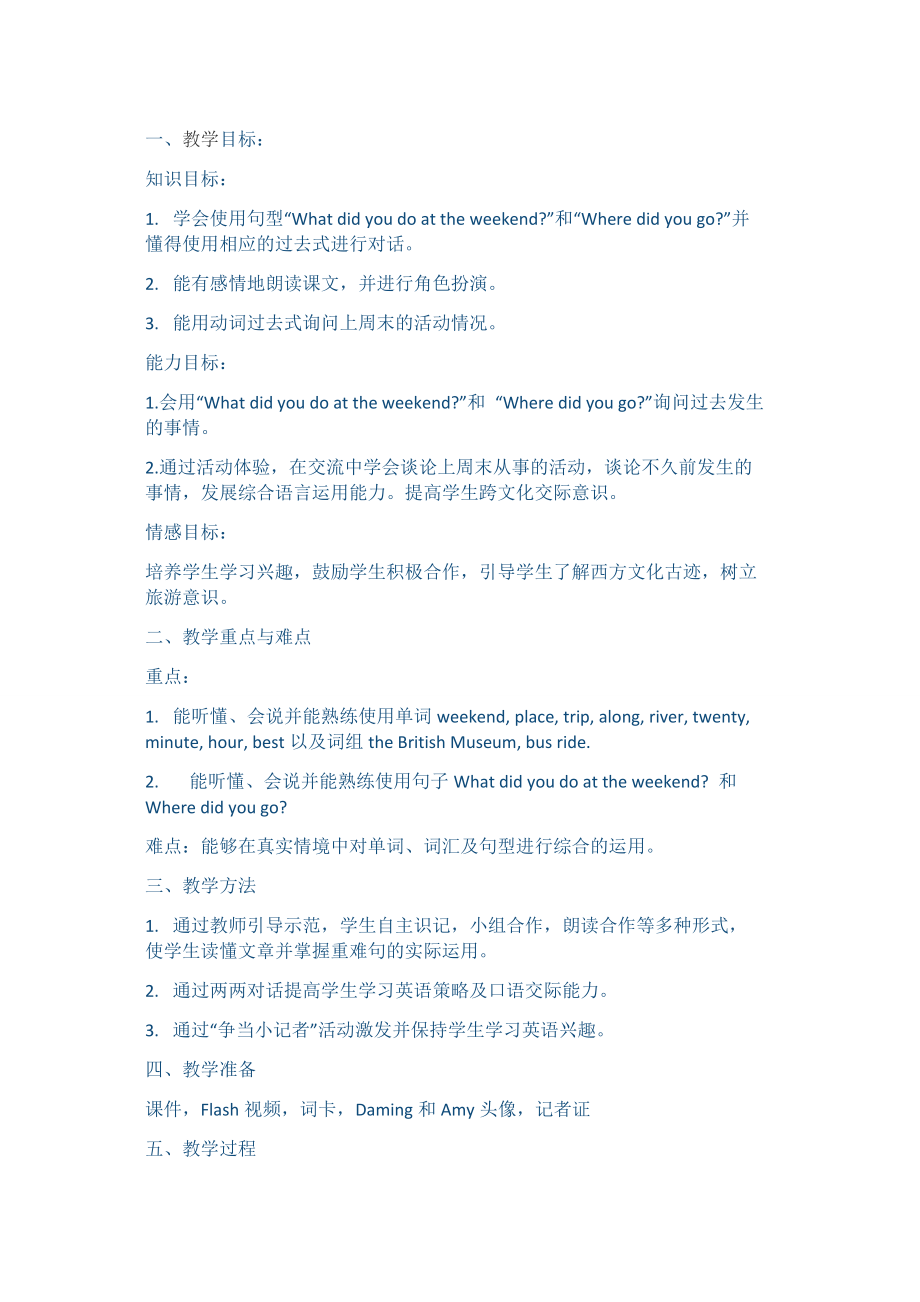《外研社三起小學(xué)五年上冊(cè)M3U1Wheredidyougo教學(xué)設(shè)計(jì)》由會(huì)員分享,可在線閱讀�,更多相關(guān)《外研社三起小學(xué)五年上冊(cè)M3U1Wheredidyougo教學(xué)設(shè)計(jì)(3頁(yè)珍藏版)》請(qǐng)?jiān)谘b配圖網(wǎng)上搜索�����。
1����、一���、教學(xué)目標(biāo):
知識(shí)目標(biāo):
1. 學(xué)會(huì)使用句型“What did you do at the weekend?”和“Where did you go?”并懂得使用相應(yīng)的過(guò)去式進(jìn)行對(duì)話。
2. 能有感情地朗讀課文��,并進(jìn)行角色扮演�。
3. 能用動(dòng)詞過(guò)去式詢問(wèn)上周末的活動(dòng)情況。
能力目標(biāo):
1.會(huì)用“What did you do at the weekend?”和 “Where did you go?”詢問(wèn)過(guò)去發(fā)生的事情�。
2.通過(guò)活動(dòng)體驗(yàn)���,在交流中學(xué)會(huì)談?wù)撋现苣氖碌幕顒?dòng)�����,談?wù)摬痪们鞍l(fā)生的事情���,發(fā)展綜合語(yǔ)言運(yùn)用能力��。提高學(xué)生跨文化交際意識(shí)。
情感目標(biāo):
培養(yǎng)學(xué)生學(xué)習(xí)興趣��,鼓勵(lì)學(xué)
2����、生積極合作,引導(dǎo)學(xué)生了解西方文化古跡�����,樹(shù)立旅游意識(shí)�。
二、教學(xué)重點(diǎn)與難點(diǎn)
重點(diǎn):
1. 能聽(tīng)懂��、會(huì)說(shuō)并能熟練使用單詞weekend, place, trip, along, river, twenty, minute, hour, best以及詞組the British Museum, bus ride.
2. 能聽(tīng)懂����、會(huì)說(shuō)并能熟練使用句子What did you do at the weekend? 和Where did you go?
難點(diǎn):能夠在真實(shí)情境中對(duì)單詞���、詞匯及句型進(jìn)行綜合的運(yùn)用�。
三���、教學(xué)方法
1. 通過(guò)教師引導(dǎo)示范,學(xué)生自主識(shí)記�,小組合作,朗讀合作等多種形式���,使
3�、學(xué)生讀懂文章并掌握重難句的實(shí)際運(yùn)用�����。
2. 通過(guò)兩兩對(duì)話提高學(xué)生學(xué)習(xí)英語(yǔ)策略及口語(yǔ)交際能力���。
3. 通過(guò)“爭(zhēng)當(dāng)小記者”活動(dòng)激發(fā)并保持學(xué)生學(xué)習(xí)英語(yǔ)興趣。
四�、教學(xué)準(zhǔn)備
課件,F(xiàn)lash視頻�,詞卡,Daming和Amy頭像�����,記者證
五、教學(xué)過(guò)程
Step1: Warming-up
1) Greet to the students.
2) Listen a song“Where did you go?”唱關(guān)于旅游的歌曲�,為新課做鋪墊。
Step2: Lead-in
1)教師出示自己的旅游照���。T: Class, I went to Jinan this weekend. I too
4�����、k lots of photos and ate delicious food. So I had a happy weekend. Do you know weekend?新授weekend,講解其含義�。
2)T:I had a happy weekend. Our friends Amy, Lingling and Sam had a happy weekend too. What did Amy, Lingling and Sam do at the weekend?導(dǎo)入課文教學(xué)��。
Step 3: Presention.
1) 學(xué)生觀看整課的Flash 視頻�,整體感知文本�����。找出
5����、What did Amy, Lingling and Sam do at the weekend?
2) 根據(jù)文本的具體情況����,分段聽(tīng)文本����。采用任務(wù)型教學(xué)法�����,每一個(gè)段落設(shè)置相應(yīng)問(wèn)題�,讓學(xué)生帶著問(wèn)題找答案�����。
對(duì)于文本第二段���,教師設(shè)置的問(wèn)題:Where did Amy, Lingling and Sam go? Ss: They went to the British Museum. They visited Big Ben and the London Eye.教師講授the British Museum.
對(duì)于文本第三段,讓學(xué)生跟讀Flash并且找出What did Lingling li
6�、ke best? Ss: She liked the bus ride best. 教師講解本段中出現(xiàn)的新詞匯。
3)學(xué)生整體跟讀一遍文本�����,注意模仿語(yǔ)音語(yǔ)調(diào)�。
4)學(xué)生自讀�����,遇到不會(huì)的單詞及不懂的句子可以尋求老師的幫助。
5)學(xué)生齊讀課文�����。
Step 4: Practice.
1) 教師借用Amy 和Daming頭像�,和學(xué)生一起提煉文本重點(diǎn)句,形成一組新的對(duì)話�,并板書(shū)。
Daming: What did you do at the weekend?
Amy: We visited lots of places.
Daming: Where did you go?
Am
7�����、y: We went to the British Museum, Big Ben and the London Eye.
同桌兩人對(duì)話���,男女生讀操練對(duì)話。
2) 你問(wèn)我答:Travel around Dezhou.
教師準(zhǔn)備一張圖片���,上面選取德州的幾個(gè)景點(diǎn)�����,如:長(zhǎng)河公園��,新湖風(fēng)景區(qū)��,減河濕地等�,每個(gè)景點(diǎn)下面對(duì)應(yīng)相應(yīng)的活動(dòng)�����,如:did taijiquan, took photos, played chess��,etc. 教師示范后��,同桌兩人一組�����,自主練習(xí)���。
Step5: Extension.( Talk about our travel.)
T: We all had a happ
8、y weekend. We went to lots of places and did many things. But I think in our holiday, we were happy too. Now look at this photo. This is me. Who can ask me some questions?
S1: Where did you go?
T: I went to Tianjin. Other questions?
S2: What did you do?
T: I visited my friend. You must have
9�����、happy holiday too. Now 4 Ss a group. Ask and answer.
學(xué)生小組討論��。
選取小記者��,隨機(jī)提問(wèn)班里的同學(xué)����。
最后教師總結(jié):You went to lots of places. Now let’s enjoy our class’s travel(教師課前收集學(xué)生旅游照,自制學(xué)生旅游視頻)���。 The world is a wonderful book and those who do not travel can see only a page of it.
Step6: Homework.
Describe your travel to your friends.
板書(shū)設(shè)計(jì)
Unit1 Where did you go?
Daming: What did you do at the weekend?
Amy: We visited lots of places.
Daming: Where did you go?
Amy: We went to the British Museum, Big Ben and the London Eye.
 外研社三起小學(xué)五年上冊(cè)M3U1Wheredidyougo教學(xué)設(shè)計(jì)
外研社三起小學(xué)五年上冊(cè)M3U1Wheredidyougo教學(xué)設(shè)計(jì)

